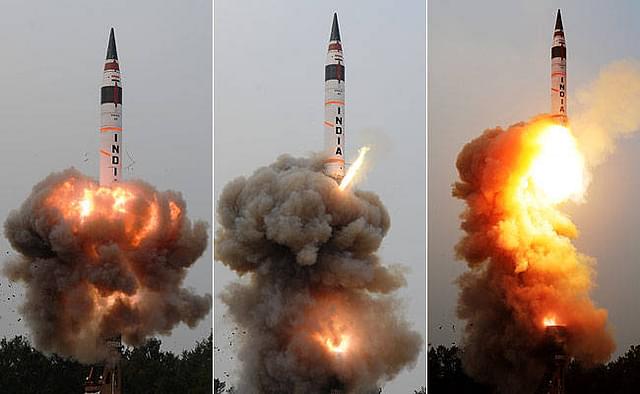India has tested a ballistic missile capable of carrying a nuclear warhead up to 5,000 kilometers, the defense ministry said, in what media called a stern signal to China as the two remain locked in a border spat.
Agni-5, which broadly falls into the category of an Intercontinental Ballistic Missile or ICBM, was launched from the APJ Abdul Kalam Island, off the coast of Odisha. The missile uses a three-stage solid-fuelled engine and can strike targets with a very high degree of accuracy. The successful test of Agni-5 is in line with India's stated policy to have credible minimum deterrence that underpins the commitment to No First Use.
The missile is the bedrock of India's nuclear deterrent along with submarine-based nuclear missiles, which had not yet been tested to anywhere close to this range.
The 17-meter-tall missile has been tested several times before, but not at night, and local media said that the timing was aimed at sending a signal to China.
Tensions with China have been running high since 20 Indian soldiers died in clashes on their disputed Himalayas border in June 2020. The nuclear-armed neighbors have since reinforced the frontier with tens of thousands of extra troops.
India has also deepened defense cooperation with Western countries in recent years, including in the Quad alliance with the United States, Japan, and Australia.
Agni-5, which broadly falls into the category of an Intercontinental Ballistic Missile or ICBM, was launched from the APJ Abdul Kalam Island, off the coast of Odisha. The missile uses a three-stage solid-fuelled engine and can strike targets with a very high degree of accuracy. The successful test of Agni-5 is in line with India's stated policy to have credible minimum deterrence that underpins the commitment to No First Use.
The missile is the bedrock of India's nuclear deterrent along with submarine-based nuclear missiles, which had not yet been tested to anywhere close to this range.
The 17-meter-tall missile has been tested several times before, but not at night, and local media said that the timing was aimed at sending a signal to China.
Tensions with China have been running high since 20 Indian soldiers died in clashes on their disputed Himalayas border in June 2020. The nuclear-armed neighbors have since reinforced the frontier with tens of thousands of extra troops.
India has also deepened defense cooperation with Western countries in recent years, including in the Quad alliance with the United States, Japan, and Australia.


















